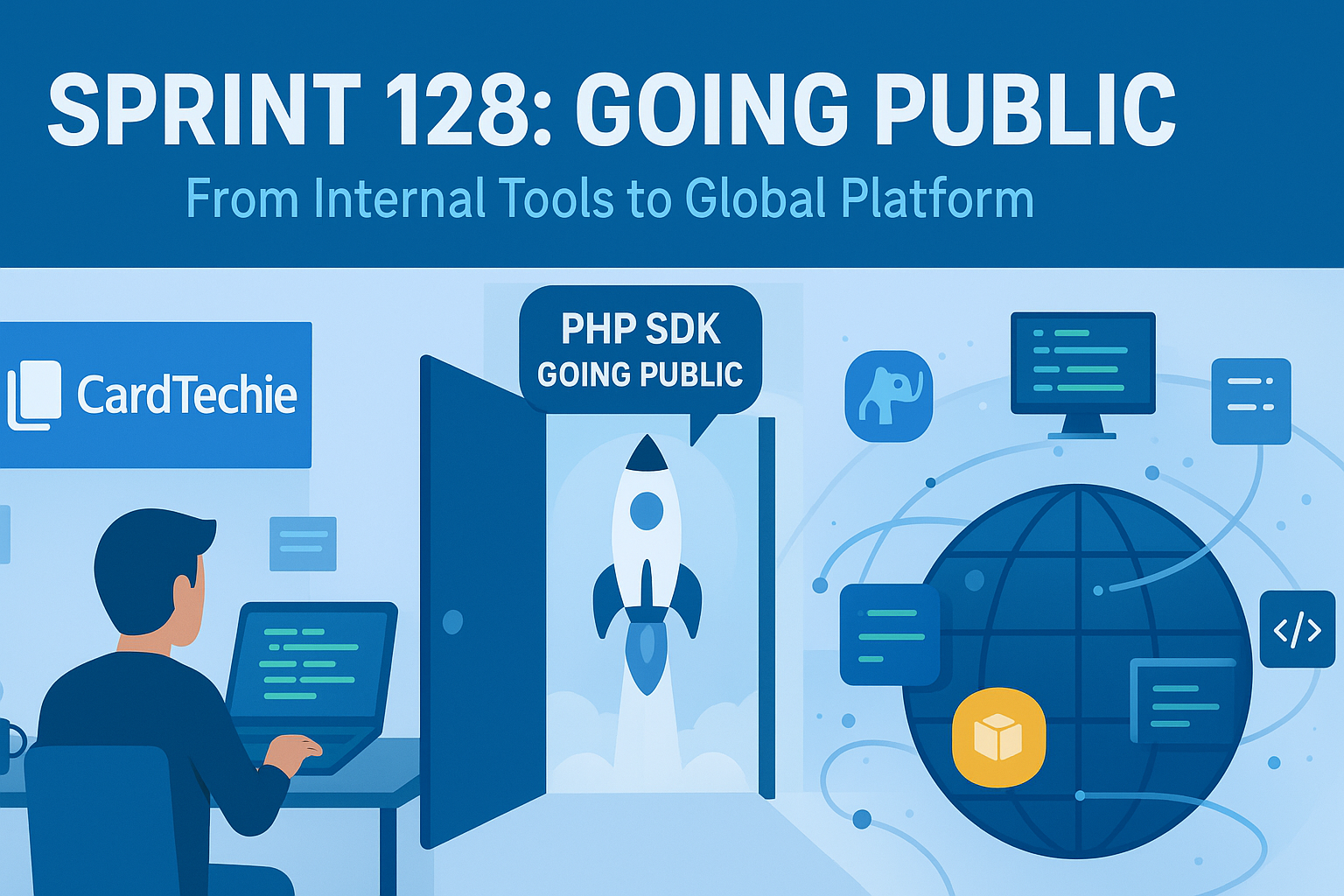
Sprint 128 was all about taking CardTechie from a collection of internal tools to a public platform that developers around the world can actually use. After months of building in relative obscurity, we finally opened the doors.
The Big Milestone: PHP SDK Going Public
The headline achievement this sprint was publishing our PHP SDK to Packagist - the global repository where PHP developers discover and install packages. This means any developer in the world can now add our trading card data to their project with a simple composer install command.
It might not sound like much, but this represents a fundamental shift from "Josh's personal tools" to "platform that other people can build on." The difference between having a working API and having a usable API.
What We Shipped
This was our most productive sprint yet with 29 completed items:
Developer Infrastructure (52% of our work)
- Complete API endpoint coverage for all data types
- Professional error handling and response validation
- Automated release processes and comprehensive documentation
- Modern Laravel compatibility (dropped Laravel 9 support for cleaner codebase)
Content & Community (38% of our work)
Trading Card API Documentation Site:
- "Trading Card API v0.4.0 Release Announcement" - Technical deep dive into our latest API capabilities
CardTechie.com:
- "Building in Public: Sprint 127 Recap" - Previous sprint retrospective and development insights
- "The Real Cost of Trading Card Data Silos" - Industry analysis on why fragmented data hurts collectors and developers
- Enhanced blog functionality with tags, categories, and better organization
- Improved site navigation and user experience
- Automated changelog systems and improved release notes
Open Source Contributions (10% of our work)
Laravel CommonMark Blog Package:
- Added configurable slug source options
- Implemented tag and category support
- Features that benefit the entire Laravel community
The Strategy Behind the Work
Looking at the numbers, this sprint had perfect balance - roughly half technical development, half ecosystem building. That wasn't accidental.
Building a platform isn't just about writing good code. You need documentation that makes sense, content that builds trust, and systems that work reliably when strangers start using them. This sprint was about proving we could handle all of that simultaneously.
What This Means for CardTechie
For developers: You can now build trading card applications without starting from scratch. Need card data? [composer require cardtechie/tradingcardapi-sdk-php](https://packagist.org/packages/cardtechie/tradingcardapi-sdk-php) and you're off to the races.
For collectors: More developers building card apps means better tools for managing collections, tracking prices, and discovering cards.
For the industry: We're creating the infrastructure layer that the trading card world has been missing. No more data silos, no more proprietary formats.
The Numbers Tell a Story
Sprint 128 was the cleanest sprint we've had:
- 100% features (zero bugs or emergency fixes)
- 29 items completed (our highest count yet)
- Zero technical debt accumulation
- Balanced work across all project areas
This suggests we've hit a rhythm where our development processes are mature enough to support consistent, predictable progress.
What's Next
Having a public SDK changes everything. Now we need to:
- Monitor adoption - Who's downloading it? How are they using it?
- Build community - Help developers succeed with our tools
- Create examples - Show what's possible with card data APIs
- Listen and iterate - Real usage will reveal what we got right and what needs work
The goal was never just to build an API. It was to enable a generation of trading card applications that didn't exist before. Sprint 128 was the moment we stopped building for ourselves and started building for everyone.
Building in Public Means Accountability
Sharing these sprint retrospectives isn't just transparency theater. When you commit to building in public, every sprint becomes a promise to the community watching your progress.
Sprint 128 delivered on those promises. The PHP SDK is live, the documentation is solid, and developers can start building. Now we find out if anyone actually wants what we've built.
The real test starts now.
Want to stay updated on CardTechie's progress? Subscribe to the newsletter for sprint updates and industry insights.
Developers interested in the PHP SDK can check out the documentation or dive straight into the Packagist package.
 Josh Harrison is the founder of CardTechie and a software engineering manager with over 20 years of experience building scalable applications. As a lifelong trading card collector and developer, he's experienced both sides of the data problem firsthand—spending countless hours manually entering card information as a collector, and facing the challenge of sourcing reliable card data as a developer. Josh is currently working on solutions to make trading card data more accessible and interoperable across the ecosystem. Follow his work at
Josh Harrison is the founder of CardTechie and a software engineering manager with over 20 years of experience building scalable applications. As a lifelong trading card collector and developer, he's experienced both sides of the data problem firsthand—spending countless hours manually entering card information as a collector, and facing the challenge of sourcing reliable card data as a developer. Josh is currently working on solutions to make trading card data more accessible and interoperable across the ecosystem. Follow his work at